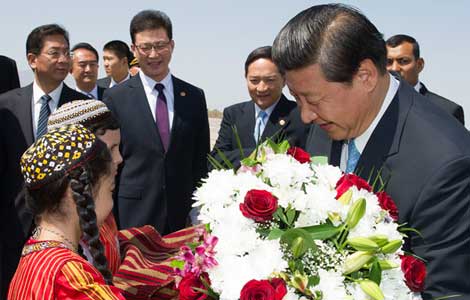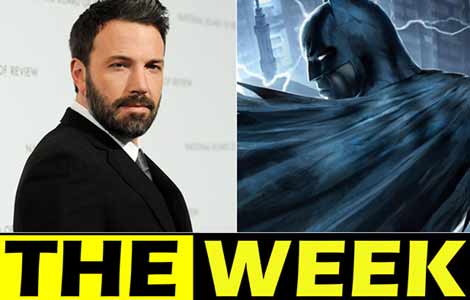Tower of Babel moment awaits NSA
Updated: 2013-09-04 07:31
By Philip J Cunningham (China Daily)
|
|||||||||
The United States is at a key crossroads, trying to regain the trust of its citizens and friendly nations around the world even while it continues to lie and dissimulate in defense of the National Security Agency's overreach. The obsessive eavesdropping of the US security state shows no signs of abating, despite the dangers it poses to US civil liberties, the conduct of diplomacy and even issues of war and peace.
US snooping on the United Nations in 2003 helped finesse the "slam dunk" diplomatic moment for promoting an ill-conceived war in Iraq, and may now influence emerging policy on Syria. Americans have unwittingly supported this dysfunctional state of affairs with their tax dollars even while spending on health, education and infrastructure has withered and crumbled.
Billions of dollars are poured into snooping, billions more on excessive secrecy, though former NSA operative Edward Snowden's vast revelations gave the world a free peek into how the world's most awesome spy machine operates.
What's more, billions of honest business dollars are at risk, because of newfound doubts about cloud computing, and billions more are likely to be lost as the world market turns away from NSA-tainted US products and insecure communication systems.
What self-respecting government wants to rely on the products of Google, Facebook, Microsoft, Intel, Yahoo, Apple or any other Silicon Valley behemoth which partners with the NSA, especially when it comes to sensitive and secure communication?
But the lost investment costs are just the tip of the iceberg. In the sharp glare of electronic snooping that makes civilian existence naked to an untold number of unknown others, whither trust, old-fashioned decency, personal privacy? Even Americans, famously dedicated to free expression, will reflexively start to self-censor and change their behavior, knowing that everything and anything communicated over the phone, the Internet, GPS or any chip-enabled device is at risk and could be used against them.
US diplomacy is also a victim of Internet hypocrisy. Former US secretary of state Hillary Clinton tirelessly traveled the world singing praise of the Silicon Valley and "Internet freedom" even while her State Department took the lead in bugging the UN and EU offices in the US and abroad.
The Barack Obama administration is facing a crisis of trust. Obama made the straight-faced claim that NSA does not listen to American phone calls and has gone as far as to say, "we don't have a domestic spying program", echoing the documented untruth told by his National Intelligence Director James Clapper, who said under oath: "We don't wittingly collect information on millions of Americans."
Joseph Nye, a Harvard professor who has worked in government intelligence, has emerged as a mild-mannered spokesman for the rude security regime that an embattled Obama is desperately trying to keep under wraps.
Nye, like other Washington D.C. insiders, insists the US is different because, well, it's different. Unlike China and Russia, the US only spies on foreigners; a spurious claim given the daily breaking news of US domestic email interception, back door access to recorded phone calls, metadata sifting, NSA information sharing with the FBI without a court order and other assaults upon the US Fourth Amendment against unlawful search and seizure.
Nye hews close to party line talking points, emphasizing that the NSA prevents terrorism, a canard that gets repeated like a mantra despite little documentary evidence of its efficacy. Nor does the repeated wolf-cry of terrorism begin to explain the extensive and intrusive snooping (including trade and economic issues) on friends, citizens and allies, which Nye rightly questions in his even-keeled apologia that acknowledges, "Americans are not without sin".
Despite this, Nye sees no hypocrisy, just "untidiness", in the way the US lives up to its democratic principles. He implies that the long reach of the NSA, which puts ears and eyes in the homes of hundreds of millions of people, is a "modest trade-off" in the name of security.
Finally, Nye engages in a deft sleight of hand, claiming that the reason we can have such a debate in the first place is because the NSA - draconian though it may be as it snoops, steals secrets, suppresses accountability and stifles debate - has, despite its lack of accountability, somehow prevented harsher draconian systems from taking root.
Would such a debate be taking place now if Snowden had not blown the whistle on NSA's over-reach? Where are the safeguards to prevent the NSA, with its capability to collect any and all personal information, from becoming a turnkey totalitarian control system?
The Internet, long hyped by its evangelists as an unstoppable force for good, has indeed grown bigger and bigger, almost beyond belief, year after year, but to what end? One day the gluttony for information and obsession with spying will cause the edifice of the NSA to face its Tower of Babel moment, whereupon the excessive noise, interference and babbling in its Panopticon might create just enough fear, loathing and pandemonium as to herald the demise of the Internet.
The author is a visiting research fellow at Cornell University, New York.
(China Daily 09/04/2013 page9)

 The first Chinese to reach US Open semi-final
The first Chinese to reach US Open semi-final
 Fewer Chinese students apply to US graduate schools
Fewer Chinese students apply to US graduate schools
 Technology transfer is a focus
Technology transfer is a focus
 Syrian refugees exceed 2m
Syrian refugees exceed 2m
 Energy partners boost gas supplies
Energy partners boost gas supplies
 San Francisco-Oakland bridge opens
San Francisco-Oakland bridge opens
 Microsoft in $7.2b deal for Nokia handset biz
Microsoft in $7.2b deal for Nokia handset biz
 Syrian refugee numbers swell to 2m: UN
Syrian refugee numbers swell to 2m: UN
Most Viewed
Editor's Picks

|

|

|

|

|

|
Today's Top News
Syria debate 'is about the world's red line': Kerry
Police name attacker who took boy's eyes
Fewer Chinese apply to US graduate schools
Energy partners boost
gas supplies
Japan urged to face history
'Diamond decade' for China, ASEAN
State asset head sacked from post
C-section vs natural birth
US Weekly

|

|






